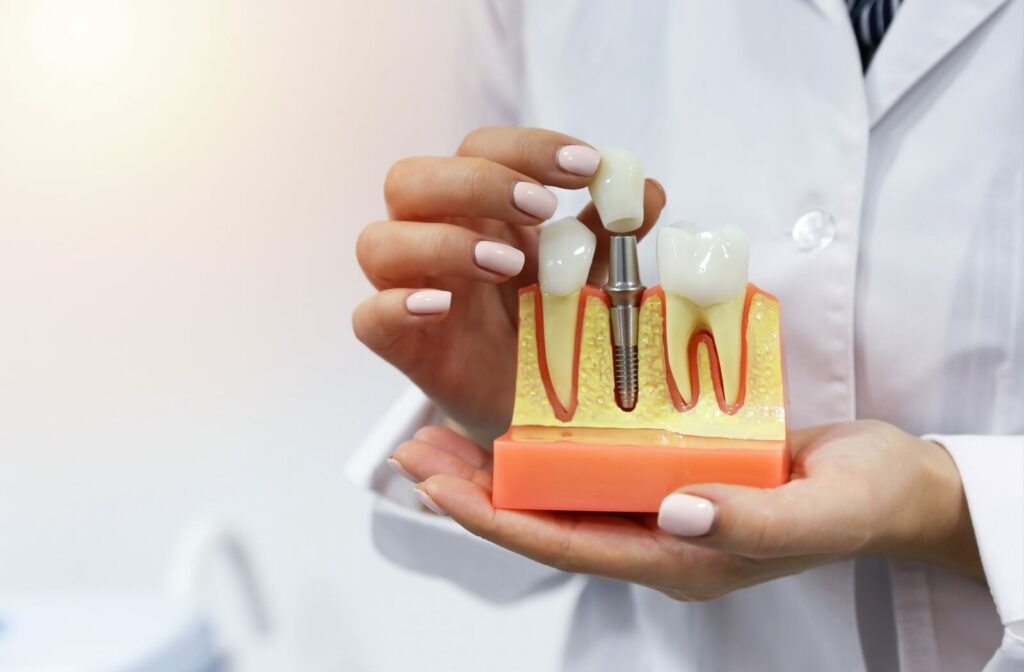Dental implants are a fantastic option for restoring your complete smile. The word “implant” likely conjures images of a permanent solution, and for the most part, that’s true. Tooth implants are posts implanted into your jawbone and act as a tooth root. A replacement tooth, or crown, is then fixed to that post. Implants have incredibly high success rates, and while they can (rarely) loosen or fail, it’s more likely the crown that comes loose, not the implant itself.
A loose crown doesn’t necessarily mean major trouble. Dental implants are reliable but still require regular care, just like natural teeth. Daily brushing and flossing and routine professional cleanings help your implant’s longevity. However, everyday wear and tear can sometimes cause the crown to become loose or damaged, requiring a visit to your dental team (that’s us!).
While implant failure is possible, it’s uncommon. If you experience a loose implant, it’s likely the crown that needs attention. Schedule an appointment with your dentist to address concerns and keep your smile healthy and happy.
Understanding Tooth Implants
A tooth implant, or a dental implant, is an artificial root typically made of titanium. People often refer to the entire structure as an implant, but the implant itself is a small screw placed into the jawbone to act as the missing tooth’s root and serves as a foundation for a crown, which is the artificial tooth fixed.
Dental implant surgery can be a long process, generally requiring several visits to the dental office with months of healing between. The first step is often a consultation, where your dentist will evaluate your oral health and discuss treatment options.
If your dentist decides an implant is the right choice, the initial procedure involves inserting the dental implant into the jawbone beneath the gum tissue. While there are other types of dental implants, this is still the most common method.
Once in place, it fuses with the bone over several months. When the implant is set, your surgeon attaches an abutment, which connects the crown and the implant.
With that, voila! You have a brand-new artificial tooth.
Benefits of Implants
Tooth implants have become a popular option for tooth replacement because they offer so many benefits. The biggest one? Their high success rate. A 2021 study showed that 94% of titanium dental implants remain strong after 15 years.
Some other benefits include:
- Preventing jaw bone loss
- A seamless look and feel
- Greater stability in surrounding teeth
- Maintaining facial structure
- Restoring bite and chewing ability
- A generally improved quality of life
The longevity and strength of dental implants are due to the fusion process, scientifically known as osseointegration. This is the process of the implant fusing with your jawbone, essentially locking the implant into place.
How Can Implants Fall Out?
Many people worry about their implant falling out, but you might find it reassuring that, in most cases, it’s the crown attached to the implant that fails, not the implant itself. The crown is the visible part of the implant that resembles your natural tooth. So, if you experience some looseness, it’s more likely a fixable crown issue, not a major implant problem.
While rare, implants do occasionally fail, but usually due to extenuating circumstances, including:
- Acute bacterial infection
- Trauma
- Material failure
- Overload
- Peri-implantitis
- Lack of osseointegration
If you’re concerned about implant loosening, consult your dentist. Early detection and management can often prevent further complications.
Factors Influencing Implant Stability
The health and stability of a tooth implant are determined by several factors, some under your control and others not.
Oral Hygiene

Implants are reliant on the gums and bone around them for support. Therefore, maintaining good oral hygiene is critical to keep the surrounding areas healthy. Brushing, flossing, and regular dental check-ups are as important for implants as for natural teeth.
On top of that, gum disease can lead to an infection around the implant, which is why you should get it treated before pursuing surgery.
Smoking
Smoking adversely affects the body’s healing process by impairing blood flow to the gums. This weakened state makes it harder for the implant to remain fused properly with the bone, significantly increasing the risk of implant failure.
Furthermore, smokers are at a higher risk of developing infections around the implant site, which can cause the implant to loosen or fail.
Not Enough Jawbone
One of the most important parts of any initial implant assessment is ensuring there’s enough bone in your jaw to hold the implant. Osseointegration is essential so the implant can bond with the jawbone.
While a bone graft can bulk up the amount of bone in your jaw, it’s not always possible.
Medical Conditions
Diseases or conditions that affect how your body heals can increase the risk of dental implant failure. Slow healing can prevent osseointegration.
This is why conditions like rheumatoid arthritis or diabetes could prevent you from getting an implant.
Factors Influencing Implant Crown Stability
Several factors can influence the longevity and stability of the crown attached to it.
Cement Quality
The type and quality of dental cement used to secure the crown to the abutment play a crucial role. Strong, long-lasting cement creates a tight seal, minimizing the risk of the crown becoming loose.
Abutment Screw
The tiny screw that connects the abutment to the implant needs to be checked for wear and tear during dental checkups. A loose screw can contribute to crown instability.
Bite Force & Habits
Chewing on very hard objects (like ice or hard candy) or clenching your teeth can put excessive stress on the crown and abutment and lead to the crown loosening over time.
Oral Hygiene
Like natural teeth, proper brushing and flossing around the implant crown is crucial. Poor oral hygiene can lead to peri-implantitis, an inflammatory condition that affects the tissues surrounding the implant and compromises the crown’s stability.
Keep Your Dental Implants in Shape
While it’s theoretically possible for dental implants to fall out, with proper care and professional advice, it’s pretty rare. The crown is more likely to fail before the implant does.
Marks Dentistry is here to help! We’ll work with you to investigate the issue and get your dental implants back working like they should. Book your appointment and start smiling!




